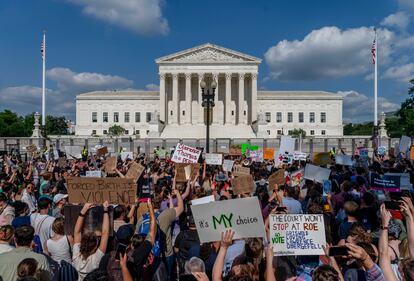Trust in Supreme Court fell to lowest point in 50 years after abortion decision, a poll shows
That’s according to the General Social Survey, a widely respected survey conducted by NORC at the University of Chicago that has been measuring confidence in the court since 1973, the same year that Roe v. Wade legalized abortion nationwide

Confidence in the Supreme Court sank to its lowest point in at least 50 years in 2022 in the wake of the Dobbs decision that led to state bans and other restrictions on abortion, a major trends survey shows.
The divide between Democrats and Republicans over support for abortion rights also was the largest ever in 2022, according to the General Social Survey. The long-running and widely respected survey conducted by NORC at the University of Chicago has been measuring confidence in the court since 1973, the same year that Roe v. Wade legalized abortion nationwide.
In the 2022 survey, just 18% of Americans said they have a great deal of confidence in the court, down from 26% in 2021, and 36% said they had hardly any, up from 21%. Another 46% said they have “only some” confidence in the most recent survey.
The drastic change was concentrated among women, Democrats and those who say a woman should be able to get an abortion if she wants one “for any reason,” the survey shows.
Just 12% of women said they have a great deal of confidence in the court in 2022, down from 22% a year earlier and from 32% in 2018. Confidence among Democrats fell to 8% in 2022 from 25% a year earlier. And among those who think abortion should be available to a woman who wants one for any reason, confidence in the court dropped from 25% to 12%.
Even among Republicans, though, confidence has slipped somewhat over the past several years in a court dominated by Republican-appointed conservative justices. Twenty-six percent said they have a great deal of confidence in the court, down from 31% in 2021 and from 37% in 2018.
The survey is conducted using in-person and online interviews over the course of several months. Most interviews were conducted after the court’s conservative majority issued its Dobbs decision in late June that overturned Roe, and all were conducted after a draft of the decision was leaked seven weeks earlier.
Support for widely available abortion did not change substantially between 2021 and 2022, but the poll shows support for widely available abortion has increased since 2016, when just 46% said that abortion should be available if a woman wants one for any reason and 54% said it should not. In the new survey, slightly more said it should be available than that it should not be, 53% to 47%.
The difference is driven by skyrocketing support for abortion rights among Democrats, while Republican levels of support are at or near a 50-year low. The 77%-28% split between Democrat and Republicans in their backing for abortion rights is the largest-ever partisan divide on the question.
Large majorities of Americans said they think a woman should be able to have an abortion if her own health is at risk, if there is a strong change of a serious defect in the baby or if the pregnancy was the result of rape.
Multiple states now ban abortion, with no exception in cases of rape or incest. Mississippi’s ban has an exception for rape but not incest.
The General Social Survey has been conducted since 1972 by NORC at the University of Chicago. Sample sizes for each year’s survey vary from about 1,500 to about 4,000 adults, with margins of error falling between plus or minus 2 percentage points and plus or minus 3.1 percentage points. The most recent survey was conducted May 5, 2022, through Dec. 20, 2022, and includes interviews with 3,544 American adults. Results for the full sample have a margin of error of plus or minus 3 percentage points.
Sign up for our weekly newsletter to get more English-language news coverage from EL PAÍS USA Edition
Tu suscripción se está usando en otro dispositivo
¿Quieres añadir otro usuario a tu suscripción?
Si continúas leyendo en este dispositivo, no se podrá leer en el otro.
FlechaTu suscripción se está usando en otro dispositivo y solo puedes acceder a EL PAÍS desde un dispositivo a la vez.
Si quieres compartir tu cuenta, cambia tu suscripción a la modalidad Premium, así podrás añadir otro usuario. Cada uno accederá con su propia cuenta de email, lo que os permitirá personalizar vuestra experiencia en EL PAÍS.
¿Tienes una suscripción de empresa? Accede aquí para contratar más cuentas.
En el caso de no saber quién está usando tu cuenta, te recomendamos cambiar tu contraseña aquí.
Si decides continuar compartiendo tu cuenta, este mensaje se mostrará en tu dispositivo y en el de la otra persona que está usando tu cuenta de forma indefinida, afectando a tu experiencia de lectura. Puedes consultar aquí los términos y condiciones de la suscripción digital.








































